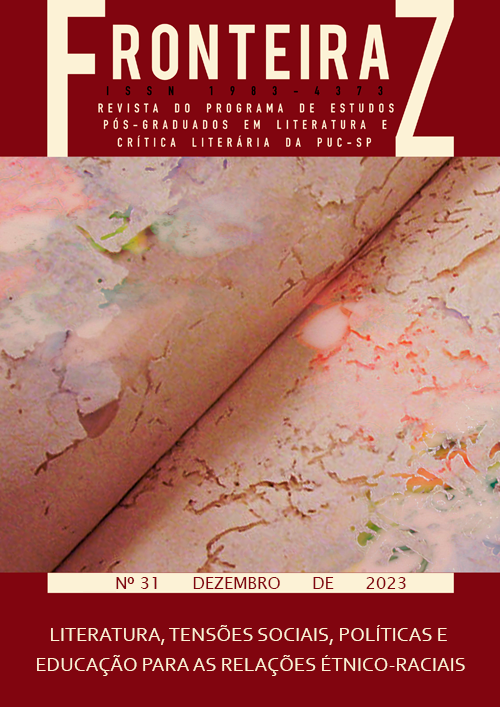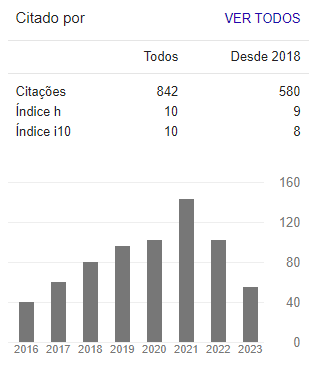Rapunzel e o Quibungo no PNLD literário
representação, autoria e negrismo nas adaptações dos contos de fadas
DOI:
https://doi.org/10.23925/1983-4373.2023i31p80-99Palavras-chave:
Literatura infantil, Clássicos adaptados, Representatividade, Identidade, Lugar de falaResumo
Este artigo analisa a versão adaptada da obra Rapunzel e o Quibungo (2012), aprovada pelo PNLD Literário – 2018. A obra adaptada por Cristina Agostinho e Ronaldo Simões retoma um conto resgatado pelos irmãos Grimm, apresentando a Rapunzel e o príncipe negros, além do Quibungo – o bicho-papão da cultura oral africana –, ambientados na Bahia no espaço da Lagoa do Abaeté. O artigo desenvolve uma reflexão acerca da representação das crianças negras por meio de personagens adaptadas na literatura, cujo teor reproduziu, ao longo de séculos, o ambiente e a visão eurocêntricos. Nessa esteira, desenvolve-se uma discussão sobre a representação, formação e valorização da identidade negra, autoria negra e Negrismo, a partir discussões de autores como Hall (2016), Oliveira (2021) Gomes (2012), Castilho (2004) e Dalcastagnè (2012), apontando para a necessidade da inserção de autores negros e suas produções no campo editorial, principalmente em Programas de incentivo à leitura como o PNLD Literário.
Referências
AGOSTINHO, C.; COELHO, R. S. Rapunzel e o Quibungo. Belo Horizonte: Editora Mazza, 2012. (Coleção De lá pra cá).
AGOSTINHO, C.; COELHO, R. S. Rapunzel e o Quibungo. Manual do Professor. Belo Horizonte: Editora Mazza, 2012. (Coleção De lá pra cá).
ARIÈS, P. História social da criança e da família. Trad. Dora Flaksman. 2. ed. Rio de Janeiro: Guanabara, 1986.
BETTELHEIM, B. A Psicanálise dos Contos de Fadas. Trad. Arlene Caetano. 16. ed. Rio de Janeiro: Paz e Terra, 2002.
BRASIL. Lei n. 10.639/2003. Altera a lei n. 9.394, de 20 de dezembro de 1996, que estabelece as diretrizes e bases da educação nacional, para incluir no currículo oficial da rede de ensino a obrigatoriedade da temática "história e cultura afro-brasileira" e dá outras providências. Diário Oficial da União, Brasília, 2003. Disponível em: http://www.planalto.gov.br/ccivil_03/leis/2003/l10.639.htm. Acesso em: 20 nov. 2023.
CARVALHO, A. E. de; CARVALHO, J. M. de; CARVALHO, M. S. de. Histórias que a Cecília contava. 2. ed. Belo Horizonte: Editora UFMG, 2011.
CASTILHO, S. D. de. A representação do negro na Literatura Brasileira: novas perspectivas. Olhar de Professor, Ponta Grossa, v. 7, n. 1, p. 103-113, 2 fev. 2004. Paraná. Disponível em: https://www.redalyc.org/pdf/684/68470108.pdf. Acesso em: 20 nov. 2023.
COELHO, N. N. O conto de fadas: símbolos mitos arquétipos. São Paulo: DCL, 2003.
CUTI. Literatura negro-brasileira. São Paulo: Selo Negro Edições, 2010.
DALCASTAGNÈ, R. Um território contestado: literatura brasileira contemporânea e as novas vozes sociais. Vinhedo: Editora Horizonte; Rio de Janeiro: Uerj, 2012.
DEBUS, E. A temática da cultura africana e afro-brasileira na literatura para crianças e jovens. São Paulo: Cortez: Centro de Ciências da Educação, 2018. [livro eletrônico].
GOMES, N. L. Sem perder a raiz: corpo e cabelo como símbolos da integridade negra. 3. ed. rev. amp. Belo Horizonte: Autêntica, 2020.
HALL, S. Representação e cultura. Trad. Daniel Miranda e William Oliveira. Rio de Janeiro: Editora PUC-Rio: Apicuri, 2016.
MACHADO, A. M. Contos de Fadas de Perrault, Grimm, Andersen e outros. Rio de Janeiro, RJ: Zahar, 2010.
OLIVEIRA, L. H. S. de. Negrismo: percursos e configurações em romances brasileiros do século XX (1928 a 1984). Belo Horizonte: Mazza, 2013.
ROCHA, P. H. B. da; MAGALHÃES, J. L. Q. de M.; OLIVEIRA, P. M. P. de. Decolonialidade a partir do Brasil. Belo Horizonte: Editora Dialética, 2020.
SANTOS, B. B. L.; GONÇALVES, L. S. M. A presença de autores negros no PNLD Literário: de que lugar estamos falando? Revista Tabuleiro de Letras, v. 17, n. 01, p. 326-340, jan./jun. 2023. Disponível em: https://www.revistas.uneb.br/index.php/tabuleirodeletras/index. Acesso em: 03 mar. 2023.
SOUSA SANTOS, B. Construindo as Epistemologias do Sul: antologia essencial. Volume I: Para um pensamento alternativo de alternativas. Ciudad Autónoma de Buenos Aires: CLACSO, 2018.
TATAR, M. Contos de fadas: edição comentada e ilustrada. Rio de Janeiro: Zahar, 2013.
Downloads
Publicado
Como Citar
Edição
Seção
Licença
Copyright (c) 2023 FronteiraZ. Revista do Programa de Estudos Pós-Graduados em Literatura e Crítica Literária

Este trabalho está licenciado sob uma licença Creative Commons Attribution-NonCommercial 4.0 International License.







 Este obra está licenciada com uma Licença
Este obra está licenciada com uma Licença 